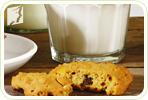If you're not into sleeping pills because they make you groggy the morning after or are worried about developing dependence, try consulting your cookbook. Eating a healthy and balanced diet can help contribute to a good night of sleep. Although it is usually not a good idea to eat a heavy meal before going to bed, it's also not a good idea to go to bed when you are too hungry.
Foods to Help Get to Sleep
What makes a food good for sleep? Some foods are warm and have an overall calming effect, while others contain compounds that aid sleep. One such compound is tryptophan, which your brain can use to make serotonin and melotonin. These neurotransmitters help gradually slower the pace of brain activity so that you can sleep more easily. Below are some foods that may help you deal with sleep disorders issues.
Warm milk

This isn't just an old wives' tale. A glass of warm milk has a two-fold effect: the small amount of tryptophan will help you get to sleep, while the warmth will soothe you and reduce stress.
Herbal tea with honey

Herbal tea with a bit of honey can also have the same effect as a glass of warm milk. Chamomile, for example, works particularly well. However, make sure your tea isn't caffeinated, or it could keep you awake.
Ice cream

Although it's not a warm snack, ice cream is also a part of the dairy group that provides tryptophan. What's more, ice cream provides lots of calcium, which is good news if you're concerned about osteoporosis.
Turkey

Turkey is a lean protein, so it can help keep your full and satisfied instead of reaching for a midnight snack. Its warmth and aroma also evoke relaxing thoughts of the holidays for many.
Fish

If you're in the mood for a fancy dinner, try going out for fish or seafood. This healthy dinner option also contains omega-3 fatty acids, which are good for your blood pressure and overall health.
Recommendations for Nighttime Eating
Eating too much food before bed can actually cause insomnia because digestion interferes with the sleep process. However, if you're in the mood for a late-night snack, try some whole-grain cereal or granola with milk or yogurt. This combination is a bedtime winner. It is also a good idea to consult with a doctor if you are suffering from insomnia, especially chronically.
Sources
- Australian Menopause Society. (2014). Sleep disturbance and the menopause. Retrieved September 30, 2015, from https://www.menopause.org.au/for-women/information-sheets/32-sleep-disturbance-and-the-menopause
- Eichling, P.S. & Sahni, J. (2005). Menopause Related Sleep Disorders. Journal of Clinical Sleep Medicine, 1(3). Retrieved September 30, 2015, from http://www.aasmnet.org/JCSM/Articles/010312.pdf.
- Garcha, P.S., Aboussouan, L.S., & Minai, O. (2013). Sleep-Disordered Breathing. Retrieved September 30, 2015, from http://www.clevelandclinicmeded.com/medicalpubs/diseasemanagement/pulmonary/sleep-disordered-breathing/Default.htm



